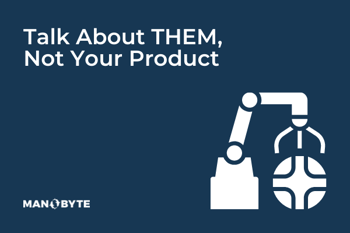
If you sell to facility or building managers, you may already know there’s a bit of a “science” with how these individuals make purchasing decisions. You have to hit a few key pain-points and establish some proven value before they’ll sign on that dotted line.
You can’t just pop a proposal down and hope they’re going to pick you, especially if you know you aren't the cheapest player in the game.
Tips for Selling to Facilities Managers in General
Here are a few of the most important facility manager sales tactics that work to get them on your client list:
 1. Focus on the Overall Financial Picture, Not Just an Immediate Solution
1. Focus on the Overall Financial Picture, Not Just an Immediate Solution
If there’s one thing these building managers know, it’s that a “quick fix” can quickly become a costly mistake if it’s made without understanding the solution in its entirety. When presenting to a manager like this, showcase the lifecycle of your product or solution and if it has an impact beyond fixing an initial problem, the long-term benefits. This is especially the case if those long-term benefits include lifetime cost savings.
 2. Back Your Statements With Research and Data
2. Back Your Statements With Research and Data
You’ve heard it before; “the proof is in the pudding,” and successful sales reps know that building managers want to establish a level of trust that whoever they select for a vendor is going to deliver. A simple way to do that is to showcase what results you’ve provided to similar businesses.
Being a facility manager is a results-oriented job, so showcasing data and results is usually right up their alley.
However, be careful not to produce too much information as it can be overwhelming for leaders who have limited time to review. Focus on the best and most favorable data points you have in your arsenal.
 3. Showcase Success Stories From Similar Companies
3. Showcase Success Stories From Similar Companies
As we’ve mentioned, establishing value is the key component of selling to this audience, so imagine you have some data to present and you can also back it up with a video testimonial from the client who experienced the results?
Not to trash-talk salespeople, but they can have a tendency to make things look better than they are, so hearing directly from a customer not only proves your product or solution is valuable, but that you are too.
 4. Don’t Waste Time
4. Don’t Waste Time
We all are busy, but a building manager is often juggling a massive to-do list in addition to the occasional building crisis or issue that appears somewhat regularly. Keep your meeting schedules focused on problem-solving and establishing value, call and show up on time for your appointments, only present data that will help the manager understand why you're the best vendor and don’t call or send too many emails. If you do, they'll likely start to tune you out.
 5. Stay Laser-Focused on Value and Results
5. Stay Laser-Focused on Value and Results
At the end of the day, building and facility managers want one thing; a trusted solution to the problem they are experiencing. The trust factor comes when you establish yourself as the vendor who can deliver the results, and when possible, some additional long-term value.
How to Sell to Hospital Facilities Managers
Building materials manufacturing and hospital management are two entirely separate worlds. Both require utmost precision and care, but there is a gap that needs bridged for manufacturers to effectively sell their products to hospital facilities managers.
When selling to facilities managers of any sort, lead with education, not a sales pitch. While this point is relevant to all modern buyers, it is especially important that you provide NEW insights to this highly educated and skilled buyer. Tell them how your material works, what it’s made of, and be transparent about improper use cases so that the facility manager has the full scope of knowledge they need to make a proper purchase decision.
Employ a content marketing strategy on your website that answers their common questions regarding durability, cost, lifetime value, ease of installation and use, and how to maintain the product. You can promote your content on Facebook and LinkedIn and deploy facility manager influencers on social to improve your brand reputation and reach.
Whenever possible, align your message towards how your product keeps pace with new technology and facility use trends. Answer facility managers’ questions about the ease of upkeep and maintenance for your particular product compared to others on the market. Align your message towards how that facility manages cleaning and maintenance operations (whether they be internal operations or outsourced by the facility manager) would not skip a beat with your product.
Tips for Selling to Hospital Facilities Managers
Hospital facilities managers are especially concerned with adhering to strict regulations and some materials and products simply are not suited for hospitals. Make sure you’ve done your research and understand if your product is suitable for hospitals so that your sales reps are not wasting time with unqualified prospects.
A few materials that ARE NOT suited for hospitals include:
- Carpets and fabrics, because they can only be sanitized by standard cleaning methods, not truly disinfected or sterilized.
- PVC, because even though it’s a versatile building material, the breakdown of PVC releases harmful chemicals.
- Additive heavy plastics, because stain treatments and phthalates treatments that are common to building materials manufacturing processes to soften PVC plastics can also release harmful chemicals as they breakdown.
- PFCs and PFOAs, because these man-made, synthetic chemicals (often used in liquid repellent coatings) do not break down in the environment.
- UF pressed wood products, because of the formaldehyde used during production.
Instead, hospital facilities managers often keep an eye out for products that are explicitly made of rubber, polyolefin, linoleum, polyester, metal, durable ceramics, CARB 1 and CARB 2 compliant plywood, untreated plastics, and bio-based plastics. If you’re looking to sell your product to hospitals, it may be truly innovative and helpful, but be turned down by facilities managers who must consider the chemical makeup and production process of your product before installing it.
As a manufacturer, you need to provide A&D, builders and contractors with this information so they know when to specify your materials and products into hospital plans and when not to. Similarly, your channel distribution partners need to be aware of when to recommend your products and materials and when not to. You don’t want a deal that’s been being worked for 6 months to fall through at the very end because proper questions were not addressed from the very beginning.
Sell More Materials for Hospitals
If your product is approved for use in hospitals and medical settings, but you’re struggling to gain traction in the market consider what gaps exist in your website content, channel marketing strategy, and customer service. Perhaps we can help fill that gap.
Get tools to map your your buyer's journey for facilities managers and other building materials and construction products end user buyer personas when you download the guide below.
Ready to Dive In?
Work with our team of Business Process experts and watch us take manual clunky systems, tech stacks, and processes and turn them into tailored, intelligent workflows that deliver business outcomes.

